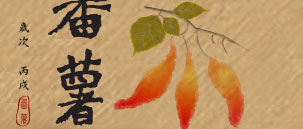





|
The funny stories in the history
|
|
| |
The Emperor Jia -Qing visited Taiwan
|
|
| |
|
|
|
| |
The red sweet potato in Zu-Shan enjoys good reputation, so that it is considered as the other name of this place. In Emperor Qyan-Long’s year 45 (A.D. 1780), the Emperor Qyan-Long paid his fifth visit to the southern of China, in the meanwhile his son, the Prince Imperial, Yu-Dian took this opportunity to come to Taiwan and made a trip here. When he stopped by the place, Lin Fey Pu, which is Zu-Shan’s former name, he tasted the red sweet potato which was contributed by the local people, and he raised his thumb and said: “Great! It is so delicious”, so he granted it a name as “Royal Sweet Potato”. |
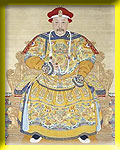
Emperor Jia -Qin
|
|
|
| |
| |
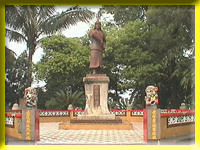
General Yong Li’s Picture
|
The red sweet potato of Zu-Shan is small and its yield is not much, but it is well known. Particularly in 1972 , the television station broadcast "The Emperor Jia-Qing visit Taiwan ", it is about a narrative of a hero, Yong Li, a general of the Qing Dynasty, who defended his countries and died in battle courageously. The visitors went to and fro Li Yong’s tomb constantly. This consecutive play not only makes the Yong Li’s Temple to be known by many people, but also raises the popularity of red sweet potato, and since then, visitors come from afar. |
|
|
| |
| |
Because the genuine red sweet potato is produced on “Zhao-Jin Mountain” which is in the suburban of Zu-Shan, the harvest is not enough for the needs. Therefore, the Tai–Agri No. 64. sweet potato, which is promoted by the farmers’ association of Zu-Shan, has been noticed gradually. Its taste is as good as the original red sweet potato, and it is good enough to meet the need of the market. |
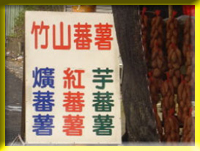
The red sweet potato of Zhushan was already short-supplied
|
|
|
| |
| |
|
| |
| |
| |
The burned sweet potato of the Jin River
|
|
| |
|
|
|
| |
The Mid-Autumn Festival is one of the traditional festivals of our country. According to the custom of Jin-Jiang, every family cooks a pot of sweet potato and taro for all family to eat on this day. There is a folklore as below: The god of the land and the goddess of the land were discussing on the things about the world of human beings, the god of the land claimed that all people in the world should live in affluence, but the goddess said that if all people live in affluence, when their daughter get married, who will carry the sedan chair for her wedding? |
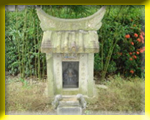
God of land claims that all people in the world should live in affluence.
|
|
|
| |
| |
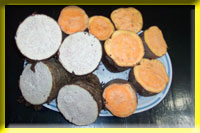
offer sacrifices to god of land with sweet potato and taro
|
The goddess believed that the wealthy people should obtain as much a fortune they can get and the poor people is not available to get more than what they have. The god of the land thought that was unreasonable, then he granted the poor people the sweet potato that can support them for half a year. The people appreciate the god's special kindness, so they offer sacrifices to god with the sweet potato and taro on the festivals and the New Year. |
|
|
| |
| |
|
| |
| |
|
| |
According to the Chinese Dictionary of the Ministry of Education, yam is the alternative given name of the sweet potato. Usually, it is cooked thoroughly with the boiled water for eating, so that it is too hard to touch and hold when it is just done. Hence, the “hot yam (sweet potato) ” is to imply to a matter that is troublesome and difficult to handle. |
|
|
| |
| |
The origin for the parlance of the “hot sweet potato” is not available to be found. However, there is a folklore regarding the Emperor of Ming Dynasty, Yuan-Zhang Zhu, relative to this word. In history, the one who takes over power by revolution or gains the power for a short while, he always doubts that somebody else might look down upon him as he comes from ignoble families. He worries that his dishonorable actions would be found, so imprisoned people on literary persecution or he is afraid that his companies might disagree with him, so he used a lot of punishment to his companies with meritorious service or kill them. |
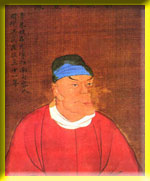
Yuan-Zhang Zhu's Picture
|
|
|
| |
| |
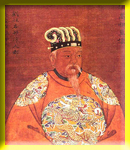
Liu-Bang, the emperor of Hang Dynasty
|
In Chinese history, only Liu-Bang, the emperor of Hang Dynasty and Yuan-Zhang Zhu, the emperor of Ming Dynasty came from civilians and they united the country and built up the dynasty. Particularly Yuan-Zhang Zhu, before he became the emperor, he had been a monk, beggar and robber, and then he killed Lin-R Han to be a rebel. In order to survive, he did some disgraceful matters. A hero should not care that he is from the bottom class, but Zhu was suspicious by nature, after his succession to the thrown, he imprisoned people on literary persecution, also discarded the prime minister, killed the liegemen with meritorious services. For the sake of making stronger monarchic power, he reorganized the government by political purge. |
|
|
| |
| |
A folk tale regarding Zhu is as below: After he became the emperor, two childhood playmates requested interview, and they wanted to gain extra advantage based on the friendship with Zhu in the childhood. One of them spoke of a matter which was about that they were hungry and collected the broken crock on the wayside and used it to cook sweet potato which they stole by digging and it was is too hot to touch when it is done. When Yuan-Zhang Zhu heard this, he was unhappy, and he ordered his followers to kill him. Then he turned his head to the other person and asked him "say the things of the past clearly", that person was meticulous, spoke of the thing of the past regarding a battle of Guan state city. The jade (similarly pronounced as Potato in Chinese) general is captured alive. Chu was very delighted to hear about this, so he granted a lot of money to this person. This story tells people that the "hot sweet potato" is really not easy for everyone to eat. |
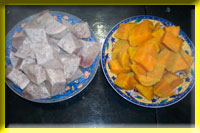
The smoky sweet potato is too hot to touch, and not everyone can eat it.
|
|
|
| |
| |
|
| |
| |
|
| |
In the peaceful times of the beginning of nine centuries of Japan, every 15th night monthly, the nobilities in the palace prepared a feast to enjoy the glories full moon or admire the moon, they drank the wine and read poetry aloud and sang. After this kind of activity, it turned to be a ceremony to “worship the moon”. On the hallway of the courtyard, in front of the papered window with moonlight, people offered oblation long grass, taro, sweet potato, glutinous rice, a round mass of food, young soybean, eggplant and wine. The long grass, young soybean, taro, sweet potato, eggplant...etc. are all the wilding plants and farm crop that represents the autumn, and they can be obtained easily, therefore, this ceremony has been carried on up to now. |
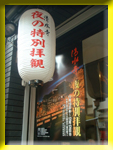
Worship the moon
|
|
|
| |
| |

"Autumn harvest fiesta"
|
In fact, before the nobility in the palace started the ceremony to worship the moon, the Japanese farmer had already had the similar sacrificial rites, was just named different. What farmer hold is "the autumn harvest fiesta", the farm crop they offer is certainly like the taro. However, the nobility assumed they were creative artist, so they sang with the breeze and enjoyed the moonlight. The commons ignore that way. The people of the village usually come together in the square, beating drums and gongs, singing, dancing and getting drunk. |
|
|
| |
| |
The Japanese in the present generation will invite people and have a feast of “full moon wine” when it is time to enjoy the full moon. Frankly speaking, Japan is a heaven for the drinker, there is “flower wine” for a feast in spring; there is “full moon wine” in autumn; there is “snow wine” in winter; as to in summer, there are more things. There are always reasons for drinking all the year round. Further more, people are tolerant of the person who is drunk. |
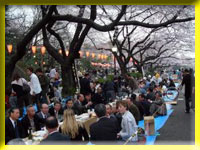
"The flower wine" of spring
|
|
|
| |
| |
|
|
|
|
|
